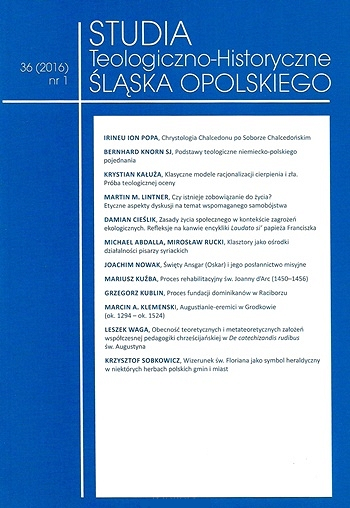Christology of Chalcedon, after the Council of Chalcedon
Christology of Chalcedon, after the Council of Chalcedon
Author(s): Irineu Ion PopaSubject(s): Christian Theology and Religion, Theology and Religion
Published by: Uniwersytet Opolski
Keywords: Chalcedon doctrine; St. Cyril of Alexandria; Orthodox Church doctrine; Zeno’s Henotikon;
Summary/Abstract: Those who interpreted the formula of St. Cyril in the opposite direction of the two natures, considered the dogmatic judgments of Pope Leo as a victory, which meant for them a victory of Nestorianism. Consequently, this party did not recognize either the Council of Chalcedon or the local bishops, who received its definition, creating a beginning for the heterodox monophysite Churches. Analyzing this period, we can see that Severus, in his argument, starts from the fact that the Logos is the subject of Jesus Christ’s nature. Being bodiless He became flesh, without changing or becoming another, so He only had the originality of being different. In this way, the word is not a new topic, but a new nature where Jesus Christ is absolutely identical with the Logos. An important role in this period was also played by the Scythian monks who appear to Constantinople in a providential moment. Rome and Constantinople being at loggerheads over Zeno’s Henotikon, were now on the verge of a new schism caused by the Christological issue. Therefore, the present study is an analysis on the definition of the Council of Chalcedon in contrast with doctrinal evolutions and arguments. It is with these concerns that we will try to show that in Jesus Christ the manhood nature itself is made to achieve real communion with God and to participate in the uncreated divine life. In this support, St. Maximus will prove that the participation of manhood nature in the Godhead is not in any way marked by passivity, but on the contrary it is genuinely restored.
Journal: Studia Teologiczno-Historyczne Śląska Opolskiego
- Issue Year: 36/2016
- Issue No: 1
- Page Range: 15-35
- Page Count: 21
- Language: English

